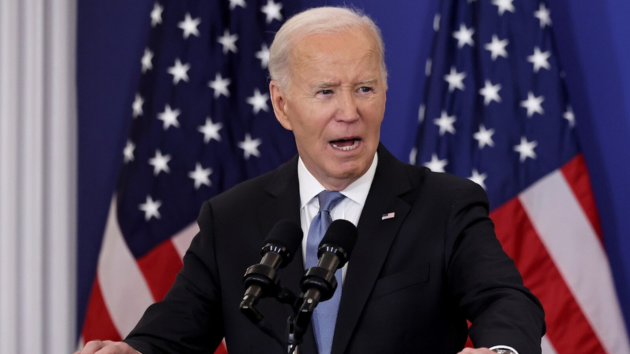(WASHINGTON) — The ceasefire and hostage release deal announced Wednesday between Israel and Hamas marks a major political and personal victory for President Joe Biden in his final days in office.
“I laid out the precise contours of this plan on May 31, 2024, after which it was endorsed unanimously by the UN Security Council,” Biden wrote in a statement. “It is the result not only of the extreme pressure that Hamas has been under and the changed regional equation after a ceasefire in Lebanon and weakening of Iran — but also of dogged and painstaking American diplomacy.”
“My diplomacy never ceased in their efforts to get this done,” Biden added pointedly about the deal he had worked on for more than a year.
A senior administration official also stressed Biden’s influence in negotiations, highlighting a series of calls he held over the last several days with key brokers in the region: Israeli Prime Minister Netanyahu, Amir Sheikh Tamim bin Hamad Al Thani of Qatar and Egyptian President Abdel Fattah El-Sis.
But President-elect Donald Trump is also seeking credit and was first to release a statement on the deal.
“This EPIC ceasefire agreement could have only happened as a result of our Historic Victory in November, as it signaled to the entire World that my Administration would seek Peace and negotiate deals to ensure the safety of all Americans, and our Allies,” Trump wrote on his social media platform.
The agreement comes after a devastating 15-month conflict that’s subsumed the Middle East.
The Israel Defense Forces said they have killed more than 15,000 combatants throughout the course of the war, which was sparked by the unprecedented Hamas terrorist attack on Oct. 7, 2023, during which more than 1,200 people were killed and another 253 were taken hostage, according to Israeli authorities. More than 46,000 people have been killed in Gaza and almost 110,000 injured, according to the Hamas-run Gaza Health Ministry, a figure does not distinguish between civilians and combatants.
Biden administration officials walked through the long timeline of negotiations to get to this point, starting with the May framework as the president noted.
“We were in intensive negotiations over that deal this summer, which many of you will recall, and those negotiations really came to a halt on Aug. 31 when Hersh Goldberg and five other hostages were killed in a tunnel,” a senior administration official said.
One of the key issues had been how many hostages Hamas had, which the official said they did not want to share for much of the past few months.
“Eventually, at the end of December, Hamas agreed to list the hostages, which then accelerated this final phase of reaching a deal,” the official said.
Since Jan. 5, the official said, negotiators have been in the region nailing down specifics including the complex details like “redeployment of Israeli forces, what Hamas must do, humanitarian provisions and the sequence of releasing hostages and releasing a number of Palestinian prisoners.”
The official added this phase of talks has been “very intense” and came together over the past 96 or so hours.
They added that Steve Witkoff, Trump’s Middle East envoy, was also in the region with Biden’s team to get the deal done.
Trump and Witkoff appeared together at a news conference at Mar-a-Lago last week, where Witkoff said “great progress” was happening in negotiations.
Trump at the time warned “all hell will break out” if a deal wasn’t struck before he returned to the White House.
“It will not be good for Hamas, and it will not be good, frankly, for anyone,” Trump warned.
Copyright © 2025, ABC Audio. All rights reserved.
